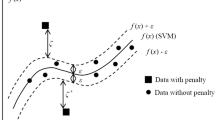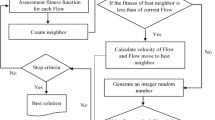Abstract
Obvious inflow variations resulting from changing environments bring big challenges to the operations of hydropower reservoirs. This study reveals the impacts of average annual inflow volume (AAIV) variations on the long term operation of a multi-hydropower-reservoir (MHR) system, and presents a strategy for determining the adaptable operation rule. The strategy includes two parts. One part is making different inflow scenarios based on the change points of AAIVs. Another part is applying the principle of cross validation to select the adaptable rule from the formulated operation rules in various inflow scenarios. Specifically, the change points of AAIVs are identified by three statistical methods. An optimization operation model of an MHR system is built, and three evolutionary and meta-heuristic algorithms are applied to resolve the model in different inflow scenarios. Based on the optimal operation results, two machine learning algorithms are employed to formulate operation rules in each inflow scenario. The MHR system at the upstream of Yellow River basin is taken as a case study. The results show that (1) the long term operation of an MHR system is sensitive to the AAIV variations; and (2) the presented strategy is feasible in determining the adaptable operation rule for an MHR system under the AAIV variations. The findings of the study are helpful for the long term operation of an MHR system under the AAIV variations.












Similar content being viewed by others
References
Aboutalebi M, Haddad OB, Loáiciga HA (2015) Optimal monthly reservoir operation rules for hydropower generation derived with SVR-NSGAII. J Water Resour Plan Manag 141(11):04015029
Acheampong AO, Boateng EB (2019) Modelling carbon emission intensity: application of artificial neural network. J Clean Prod 225:833–856
Ahmadi M, Haddad OB, Loáiciga HA (2015) Adaptive reservoir operation rules under climatic change. Water Resour Manag 29(4):1247–1266
Battiti R (1992) First- and second-order methods for learning: between steepest descent and Newton’s method. Neural Comput 4(2):141–166
Chen J, Zhong PA (2019) A multi-time-scale power prediction model of hydropower station considering multiple uncertainties. Sci Total Environ 677:612–625
Chen Y, Li J, Lu H, Xia J (2019) The dynamic benefit compensation in a multi-reservoir system based on importance analysis. J Clean Prod, in press. https://doi.org/10.1016/j.jclepro.2019.119402
Desta Y, Goitom H, Aregay G (2019) Investigation of runoff response to land use/land cover change on the case of Aynalem catchment, north of Ethiopia. J Afr Earth Sci 153:130–143
Dobson B, Wagener T, Pianosi F (2019) An argument-driven classification and comparison of reservoir operation optimization methods. Adv Water Resour 128:71–86
Eum HI, Simonovic SP (2010) Integrated reservoir management system for adaptation to climate change: the Nakdong River basin in Korea. Water Resour Manag 24(13):3397–3417
Feng M, Liu P, Guo S, Gui Z, Zhang X et al (2017) Identifying changing patterns of reservoir operating rules under various inflow alteration scenarios. Adv Water Resour 104:23–36
Kohler M, Vellasco MMBR, Tanscheit R (2019) PSO+: a new particle swarm optimization algorithm for constrained problems. Appl Soft Comput J, in press. https://doi.org/10.1016/j.asoc.2019.105865
Koutsoyiannis D, Economou A (2003) Evaluation of the parameterization-simulation-optimization approach for the control of reservoir systems. Water Resour Res 39(6):1170
Krol MS, De Vries MJ, Van Oel PR, De Araújo JC (2011) Sustainability of small reservoirs and large scale water availability under current conditions and climate change. Water Resour Manag 25(12):3017–3026
Labadie JW (2004) Optimal operation of multi reservoir systems: state-of-the-art review. J Water Resour Plan Manag 130(2):93–111
Li XZ, Chen ZJ, Fan XC, Cheng ZJ (2018) Hydropower development situation and prospects in China. Renew Sust Energ Rev 82:232–239
Liu LL, Du JJ (2017) Documented changes in annual runoff and attribution since the 1950s within selected rivers in China. Adv Clim Chang Res 8:37–47
Liu P, Li L, Chen G, Rheinheimer D (2014) Parameter uncertainty analysis of reservoir operating rules based on implicit stochastic optimization. J Hydrol 514:102–113
Liu S, Huang S, Huang Q, Xie Y, Leng G et al (2017) Identification of the non-stationarity of extreme precipitation events and correlations with large-scale ocean-atmospheric circulation patterns: a case study in the Wei River basin, China. J Hydrol 548:184–195
Meng XJ, Chang JX, Wang XB, Wang YM (2019) Multi-objective hydropower station operation using an improved cuckoo search algorithm. Energy 168:425–439
Ming B, Chang JX, Huang Q, Wang YM, Huang SZ (2015) Optimal operation of multi-reservoir system based on cuckoo search algorithm. Water Resour Manag 29:5671–5687
Ming B, Liu P, Guo S, Zhang X, Feng M et al (2017) Optimizing utility-scale photovoltaic power generation for integration into a hydropower reservoir by incorporating long- and short-term operational decisions. Appl Energy 204:432–445
Niu WJ, Feng ZK, Feng BF, Min YW, Cheng CT et al (2019) Comparison of multiple linear regression, artificial neural network, extreme learning machine, and support vector machine in deriving operation rule of hydropower reservoir. Water 11:88
Perolat J, Couso I, Loquin K, Strauss O (2015) Generalizing the Wilcoxon rank-sum test for interval data. Int J Approx Reason 56:108–121
Rani D, Moreira MM (2010) Simulation-optimization modeling: a survey and potential application in reservoir systems operation. Water Resour Manag 24:1107–1138
Reddy MJ, Kumar DN (2006) Optimal reservoir operation using multi-objective evolutionary algorithm. Water Resour Manag 20(6):861–878
Ryberg KR, Hodgkins GA, Dudley RW (2019) Change points in annual peak streamflows: method comparisons and historical change points in the United States. J Hydrol, in press. https://doi.org/10.1016/j.jhydrol.2019.124307
Sankarasubramanian A, Lall U, Espinueva S (2008) Role of retrospective forecasts of GCMs forced with persisted SST anomalies in operational streamflow forecasts development. J Hydrometeorol 9(2):212–227
Wang Z, Sobey A (2019) A comparative review between genetic algorithm use in composite optimization and the state-of-the-art in evolutionary computation. Compos Struct, in press. https://doi.org/10.1016/j.compstruct.2019.111739
Wang J, Huang W, Ma G, Ma G, Wang Y (2016) Determining the optimal year-end water level of a multi-year regulating storage reservoir: a case study. Water Sci Technol Water Supply 16(2):284–294
Wong T (2015) Performance evaluation of classification algorithms by k-fold and leave-one-out cross validation. Pattern Recogn 48:2839–2846
Xie MF, Zhou JZ, Li CL, Zhu S (2015) Long-term generation scheduling of Xiluodu and Xiangjiaba cascade hydro plants considering monthly streamflow forecasting error. Energy Convers Manag 105:368–376
Xiong Z, Cui Y, Liu Z, Zhao Y, Hu M, Hu J (2020) Evaluating explorative prediction power of machine learning algorithms for materials discovery using k-fold forward cross-validation. Comput Mater Sci 171:109203. https://doi.org/10.1016/j.commatsci.2019.109203
Yang Z, Liu P, Cheng L, Wang H, Ming B et al (2018) Deriving operating rules for a large-scale hydro-photovoltaic power system using implicit stochastic optimization. J Clean Prod 195:562–572
Zhang Z, Zhang S, Geng S, Jiang Y, Hui L, Zhang D (2015) Application of decision trees to the determination of the year-end level of a carryover storage reservoir based on the iterative dichotomizer 3. Int J Electr Power Energy Syst 64:375–383
Zhang X, Yu X, Qin H (2016) Optimal operation of multi-reservoir hydropower systems using enhanced comprehensive learning particle swarm optimization. J Hydro Environ Res 10:50–63
Zhang D, Lin J, Peng Q, Wang D, Yang T et al (2018) Modeling and simulating of reservoir operation using the artificial neural network, support vector regression, deep learning algorithm. J Hydrol 565:720–736
Zhao T, Zhao J (2014) Joint and respective effects of long- and short-term forecast uncertainties on reservoir operations. J Hydrol 517:83–94
Acknowledgements
This study was supported by the Fund of the State Key Laboratory of Eco-hydraulics in Northwest Arid Region, Xi’an University of Technology (2018KFKT-5), China Postdoctoral Science Foundation (2018 M642338), National Natural Science Foundation of China (41601488) and Natural Science Foundation of Jiangsu Province (BK2016046).
Author information
Authors and Affiliations
Corresponding author
Ethics declarations
Conflict of Interest
None.
Additional information
Publisher’s Note
Springer Nature remains neutral with regard to jurisdictional claims in published maps and institutional affiliations.
Rights and permissions
About this article
Cite this article
Liu, S., Xie, Y., Fang, H. et al. Impacts of Inflow Variations on the Long Term Operation of a Multi-Hydropower-Reservoir System and a Strategy for Determining the Adaptable Operation Rule. Water Resour Manage 34, 1649–1671 (2020). https://doi.org/10.1007/s11269-020-02515-6
Received:
Accepted:
Published:
Issue Date:
DOI: https://doi.org/10.1007/s11269-020-02515-6




